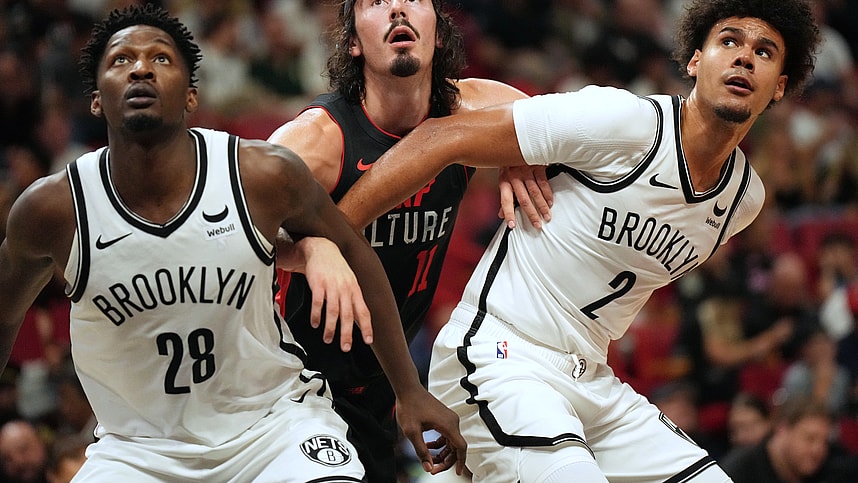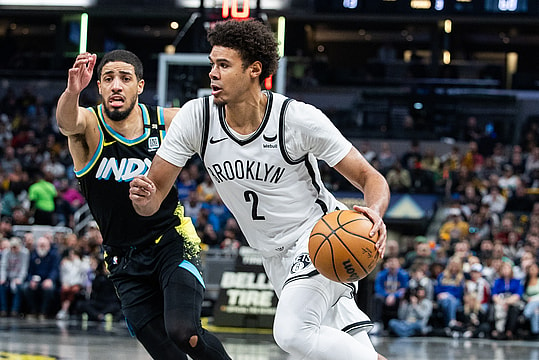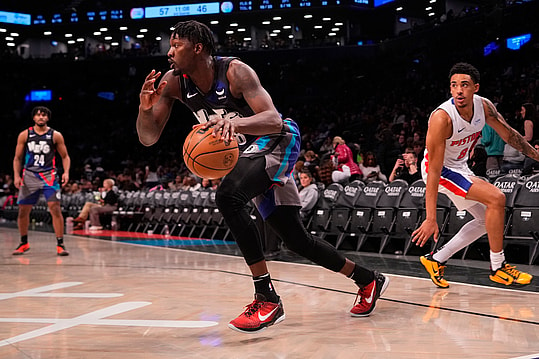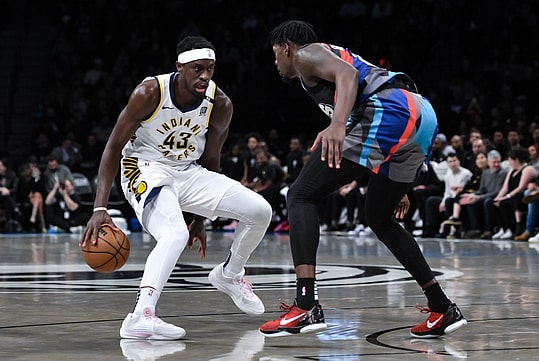
Following the Mikal Bridges trade many people assumed that the Brooklyn Nets would continue the rebuild by trading any remaining veteran that wasn’t nailed down. The two most prominent candidates were forwards Cameron Johnson and Dorian Finney-Smith, both of whom generated a ton of interest around the league.
We’ve taken a look at some potential packages with rumored suitors for Johnson and Finney-Smith however as the days have gone by and we move into the NBA offseason’s doldrums movement of either player is starting to seem less and less likely. Instead, it may seem that teams are reluctant to meet general manager Sean Marks’ price and that Marks is content to hold onto his two best remaining trade chips.
There are pros and cons to holding onto these assets, and it’s important to remember that even though they may start the season with the team, that doesn’t mean they’ll finish it. Let’s take a deeper look at the risks and benefits of each player as the calendar moves forward.
Pros and Cons of Cameron Johnson starting the year on the team
Last offseason the Nets re-signed Johnson to a four-year deal with $90 million guaranteed, which covers the prime of his career from his age 27 season last year through his age 30 season in the contract’s final year. Now with three years remaining, there’s no urgency to move Johnson immediately.
While that level of team control may be attractive to certain young teams that are looking to move to or solidify themselves as contenders (i.e. Cleveland, Orlando, San Antonio, etc), absorbing a deal that ranges from $21-$23 million per year for three more seasons may be seen as a hindrance for more established contenders who have become gun shy about taking on big money for non-stars with the introduction of, and limitations imposed by, the second apron this offseason.

Moreover, while Cameron Johnson’s 2023-2024 stat line of 13.4 points, 4.3 rebounds, and 2.4 assists per game on 44.6% from the field, 39.1% from three, and 78.9% from the charity stripe were nearly identical to his career numbers of 11.7 points, 3.9 rebounds, and 1.7 assists per game on 44.7%/39.2%/83.0% shooting, he struggled with inconsistency at times last season. Having more time to establish consistency should cement him as an upper-level 3-and-D wing and only improve his trade value.
Lastly, having some competent veterans on the roster is imperative to maximize the development of Brooklyn’s young core. In a vacuum simply playing the young guys and only the young guys makes sense, however, without NBA-caliber veterans around them bad habits can develop and growth can be stunted.
On the other hand, more times than not the best time to make a trade is to strike while the iron is hot. While Johnson is under contract for three more seasons, the deeper he gets into his contract the smaller his market becomes. As he ages, young teams looking to make the leap won’t be interested and the pool will become limited to contenders who have a need for a 3-and-D forward.
There are also the risks of injury and poor performance. Johnson has consistently missed time throughout his career, never playing more than 66 games in a season. There’s also a chance he never returns to the 16.6 points per game scorer he was after arriving in Brooklyn in 2023. These risks exist with every player, but they are more profound with a player who doesn’t have a star pedigree.
The Pros and Cons of Dorian Finney-Smith starting the year on the team
Finney-Smith’s case is more cut and dry. The 31-year-old forward’s contract expires at the end of the season, however, a player option complicates matters both for the Nets and his potential suitors. Without that player option standing in the way, he would be the classic case of a one-year rental for a team with title aspirations.

That said, the option does exist and after seeing how the average role player has been squeezed in the market with the advent of the second apron, Finney-Smith may very well exercise that option. Any team acquiring him must be okay with that scenario playing out.
For the Nets, his value could potentially rise at the trade deadline, especially if a contender were to suffer injury or poor performance at the forward positions. At that point, any team acquiring Finney-Smith would only be on the hook for a season and a half of salary obligations at maximum. However, should Finney-Smith break camp with the Nets and not be moved at the deadline, they may lose him for nothing should he decline his option.
- Nets have had busy offseason despite mulling Cam Thomas’ future
- Nets select polarizing prospect Egor Demin with No. 8 pick in NBA draft
- What can Nets’ former All-Star provide to contending teams following contract buyout?
At the end of the day, it’s not the worst thing in the world if Finney-Smith finishes out the season with the Nets. As mentioned above regarding Johnson, having capable veterans to fill NBA roles only helps the development of the young core. That said, the Nets would hate to squander an asset that they know has no future with the team.
The situation is something to monitor

While things typically slow down as we progress closer to August, a trade can be made at any time. Once camp starts, the inevitable injury could make a contender desperate enough to meet Marks’ price for one or both of these veterans who are cut from the coveted 3-and-D wing cloth.
And while we’re waiting and watching, remember that Marks has a price for each in his mind and won’t settle for anything less. Sometimes, like with the Bridges trade, that works out swimmingly, and sometimes he ends up with an egg on his face. Regardless, it will be something to monitor as the Nets inch closer to opening night.
More about:Brooklyn Nets